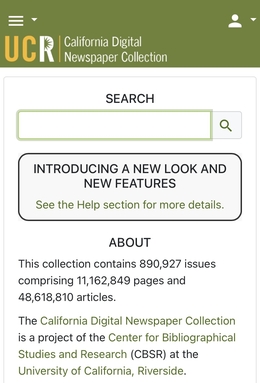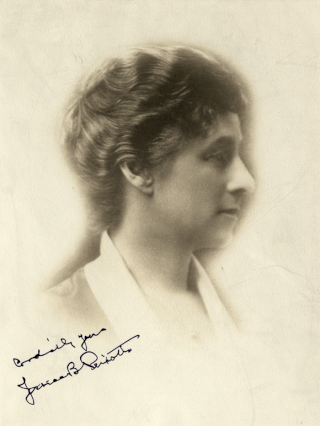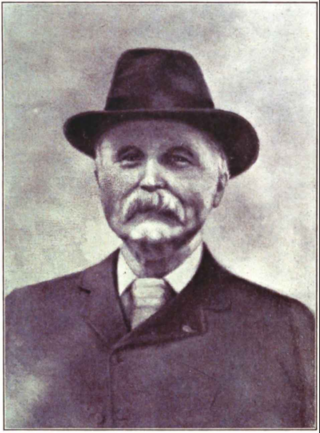
The California Equal Suffrage Association (CESA) was a political organization in the state of California with the intended goal of passing women's suffrage.

The California Equal Suffrage Association (CESA) was a political organization in the state of California with the intended goal of passing women's suffrage.
In 1870 the California State Woman Suffrage Society or California Woman Suffrage Association was founded by Laura de Force Gordon. [1] The California Woman Suffrage Association changed its name from California Woman Suffrage Association to California Equal Suffrage Association in 1896 to appeal to male sympathisers. [2]
The California Equal Suffrage Association (CESA) was headquartered in northern California and was founded by suffragist Elizabeth Lowe Watson. [3] It was incorporated in 1904. [4] The original name of the organization was The California Woman's Suffrage Association. [5] [6] Part of the reason for rebranding the organization was to reach out to men for support of the suffrage cause. [7] The CESA would actively seek out the support of men. [8] Activists affiliated with this organization lobbied for women's suffrage from automobiles and produced goods for purchase such as playing cards and postcards. [9]
Suffragist Gail Laughlin traveled the state in November 1904 campaigning on behalf of suffrage and spreading the word about this organization. [10] Historian Gayle Gullett noted that the Los Angeles Times referred to the attendees as "several hundred assertive-appearing women." [11] In 1905 the organization distributed pamphlets promoting the suffrage cause in the California Senate chamber. [12] In September of that year they held their state convention. [13] Attendees included Caroline Severance, Mary Sperry, Anna Bidwell and Ellen Clark Sargent. [13]

Caroline Severance was designated an honorary president of this organization in 1905. [14] Suffragist Lillian Harris Coffin created a central committee for the CESA in 1906. [15] Berkeley attorney Mary McHenry Keith also served as president of the CESA. [16]

The California State Library is the state library of the State of California, founded in 1850 by the California State Legislature. The Library collects, preserves, generates and disseminates a wide array of information. Today, it is the central reference and research library for state government and the Legislature. The California State Library advises, consults with and provides technical assistance to California's public libraries. It directs state and federal funds to support local public libraries and statewide library programs, including Institute of Museum and Library Services (IMLS) grants. The California State Library's mission is to serve as "...the state’s information hub, preserving California’s cultural heritage and connecting people, libraries and government to the resources and tools they need to succeed and to build a strong California." Two of its branches are located in Sacramento, California, at 914 Capitol Mall and 900 N Street. A third branch, located in the California State Capitol, closed in 2020 in preparation for the demolition of the Annex and is expected to return when the new building is completed. The Sutro Library is in the San Francisco State University library building.

The Los Angeles Chinese massacre of 1871 was a racial massacre targeting Chinese immigrants in Los Angeles, California, United States that occurred on October 24, 1871. Approximately 500 white and Latino Americans attacked, harassed, robbed, and murdered the ethnic Chinese residents in what is today referred to as the old Chinatown neighborhood. The massacre took place on Calle de los Negros, also referred to as "Negro Alley". The mob gathered after hearing that a policeman and a rancher had been killed as a result of a conflict between rival tongs, the Nin Yung, and Hong Chow. As news of their death spread across the city, fueling rumors that the Chinese community "were killing whites wholesale", more men gathered around the boundaries of Negro Alley.

The College Equal Suffrage League (CESL) was an American woman suffrage organization founded in 1900 by Maud Wood Park and Inez Haynes Irwin, as a way to attract younger Americans to the women's rights movement. The League spurred the creation of college branches around the country and influenced the actions of other prominent groups such as National American Woman Suffrage Association (NAWSA).

The California Digital Newspaper Collection (CDNC) is a freely-available, archive of digitized California newspapers; it is accessible through the project's website. The collection contains over six million pages from over forty-two million articles. The project is part of the Center for Bibliographical Studies and Research (CBSR) at the University of California Riverside.

Laura de Force Gordon was a California lawyer, newspaper publisher, and a prominent suffragette. She was the first woman to run a daily newspaper in the United States, and the second female lawyer admitted to practice in California.
The California Nursery Company was established in Niles, California, and incorporated in 1884 by John Rock, R. D. Fox, and others. The nursery sold fruit trees, nut trees, ornamental shrubs and trees, and roses. It was responsible for introducing new hybrids created by such important West Coast breeders as Luther Burbank and Albert Etter.

Jessica Blanche Peixotto was an American educator and writer.
Rose Hooper (1876-1963) was an American painter of miniatures. Born in San Francisco, she was the daughter of Col. William B. Hooper, proprietor of the Occidental Hotel in San Francisco, CA, and his wife, Eleanor. The family was part of high society in San Francisco, and Rose Hooper was a debutante in the 1895–1896 season. Hooper married Charles Albert Plotner on October 25, 1903, in Philadelphia, PA. The couple had a son, Selden Hooper Plotner, but divorced in 1910. Hooper's second husband was William C. Lyons.

John Rock was a German-born American horticulturalist and nurseryman. John Rock was a leader in California in pomology and the nursery business from 1865 until his death in 1904. Charles Howard Shinn wrote the entry for John Rock in L.H. Bailey's Cyclopedia of Horticulture He said "John Rock's scientific spirit, his wide and ever-increasing knowledge, his very high standards of business and his unselfishness made him during his long life the leader of Pacific coast nurserymen. He introduced more valuable plants and varieties to American horticulture than any other man of his period. His connection with Japan, India, Australia and with the great establishments abroad was close and constant. He did much to encourage men like Luther Burbank, and his collections were always at the service of students and the public."
The Kingsburg Recorder is a weekly paper covering Kingsburg, CA and the surrounding communities of Fresno County, California. The paper is owned by Lee Central California Newspapers which, in 2015, combined the Kingburg Reporter with the Selma Enterprise, consolidating printing operations at the Santa Maria Times printing location.
Snell Seminary School for Women was a girls school in Oakland and then Berkeley, California.
This timeline provides an overview of the political movement for women's suffrage in California. Women's suffrage became legal with the passage of Proposition 4 in 1911 yet not all women were enfranchised as a result of this legislation.

The women's suffrage movement began in California in the 19th century and was successful with the passage of Proposition 4 on October 10, 1911. Many of the women and men involved in this movement remained politically active in the national suffrage movement with organizations such as the National American Women's Suffrage Association and the National Woman's Party.
Selina Solomons (1862–1942) was a California suffragist active in the 1911 campaign which resulted in the passage of Proposition 4. Solomons wrote a first hand account of the movement titled, "How We Won the Vote in California".

María Guadalupe Evangelina de López (1881-1977) was an American activist in the Women's suffrage movement in California. In the 1910s, she campaigned and translated at rallies in Southern California, where suffragists distributed tens of thousands of pamphlets in Spanish.

Mary Wood Swift was an American suffragist and clubwoman, president of the National Council of Women of the United States from 1903 to 1909.
Mary Elizabeth Simpson Sperry, was a leading California suffragist. She served as president of the California Woman Suffrage Association in 1900-1907.

Minora Ellis Kibbe was a social reformer and suffragist from California. She ran for a seat on the San Francisco area school board in 1908, and for California's 36th State Assembly district in 1918.

Genevieve Allen (1881–1938) was an American suffragist, one of the pioneer suffrage workers of the state of California. She was the legislative head of the California branch of the National Woman's Party. She worked with Alice Paul, one of the founders of the National Woman's Party, and other important activists for women's suffrage and political rights in United States.